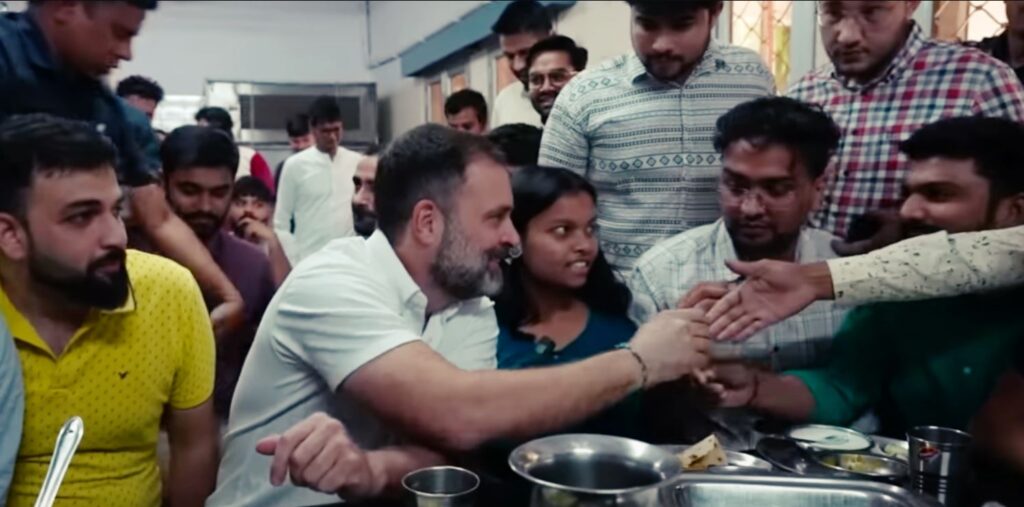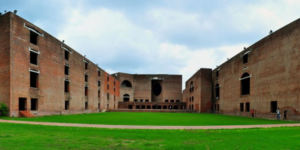One must applaud the sense of duty shown by the authorities of Delhi University for issuing a warning to Rahul Gandhi for his “unauthorised” visit to a hostel. They are so dutiful that they do not care about his status as a member of a ‘shahi parivar’, as the prime minister described the Congress leader recently. For them, he is just a trespasser, maybe even a criminal!
First, some context. On Wednesday, May 10, Rahul Gandhi went to the Delhi University’s PG Men’s Hostel at lunchtime, without any prior publicity. In pictures and videos, he is seen getting down from his car and entering the hostel. There is no crowd around him and his own security personnel are also not seen pushing people away. It is a sparse crowd, if we can call it a crowd at all! In other pictures, he is seen eating food in the hostel mess. There are students around him, also eating their food. They seem to be in an animated discussion. Apparently, he also interacted with students associated with the Akhil Bharatiya Vidyarthi Parishad, which is an affiliate of the Rashtriya Swayamsevak Sangh, the ideological parent of the BJP.
In this era, news reaches the whole world the very next moment. But nothing more was known about Rahul Gandhi’s hostel visit, other than that he ate with the students and chatted with them for about 40 minutes. Rahul himself did not beat the drum of this “outreach”, as such visits are called these days. This shows that Rahul Gandhi didn’t want to make a national affair out of something that was solely between him and the students of the hostel.
If anyone was inconvenienced even a little bit by Rahul Gandhi’s visit to the hostel, it would have become news immediately. Was any student not able to each lunch due to the politician’s arrival? Was there any hindrance to the study schedule of the students? If there was an incident involving Rahul Gandhi that could have further discredited him, it would’ve been played up. But that did not happen.
The visit turned into news only when a university official objected to Rahul Gandhi’s ‘unauthorised’ entry to the hostel. According to the authorities, entering the hostel without taking permission was inappropriate and against the rules – after all, campuses or hostels are not public places. They are safe places and traffic there cannot be uncontrolled. They wondered how a leader of such a tall stature, who has been given state security, can be so irresponsible as to come to the hostel in this manner. It could have led to chaos. He said that it was time for the students to eat. He put them in great trouble. Disrupted their schedule! They have received complaints, they claim. According to them, Rahul Gandhi was very reckless and made the students vulnerable.
But just making a statement did not suffice. The university authorities must be admired, because they don’t do anything half-baked. They take things to their logical conclusion. We know now that the officials are sending a notice to Rahul Gandhi. Is it seeking an explanation from him? A colleague, excited by this news, said that they should in fact file an FIR against him for trespassing. He must be treated as an ordinary citizen, bound by the laws of the land.
The critics disagree
But there are people who say that even Rahul Gandhi doesn’t claim that he should be treated differently. He is not even an MP anymore. He is a leader of the opposition Congress party and a popular face. But should this fact deprive him of the rights that any ordinary citizen of India has?
These critics say that whether it is Delhi University or any other place, ordinary people have the right to entry. Are there rules which say permission must be sought from the university authorities before entering the campus of Delhi University? Anyone can visit anyone, even in the hostel. Does meeting students or eating with them create chaos?
In fact, I am also anxious after reading about the notice to Rahul Gandhi. I have been called by students of the JNU and Jamia Millia Islamia for meetings many times. I have never sought the permission of the university authorities. I am also an ordinary person. So, was I trespassing?
This episode, for the critics, is as laughable as the one in which PGIMER authorities in Chandigarh are said to have punished women students who did not attend the event where the 100th episode of Narendra Modi’s radio programme “Mann Ki Baat” was broadcast. Many institutions had made it mandatory for employees, students and teachers to participate in this public display of loyalty to Narendra Modi. How could these students dare disobey the order of the authorities?
The critics claim that the Delhi University officials are trying to prove their loyalty to their bosses. By showing that they can humiliate Rahul Gandhi, they are trying to raise their stock in the eyes of those in charge. They point out that the university is not a government body. Students are not minors and university officials are not their guardians.
They also allege that they know incidents involving the one and only authorised nationalist student organisation on the campus attacking students of other organisations or even unaffiliated students. But the authorities have never shown any willingness to call out this violence, forget the promptness with which notices were issued to Rahul Gandhi, the critics say. They point out that the university now regularly invites big and small RSS pracharaks officially. As if the official ideology of the university is Hindutva nationalism. The critics ask, while giving these RSS fellows a seat on the official table, have the university authorities ever thought about the symbolic violence that it inflicts on Muslim and Christian students? Who will be held responsible for the psychological torture these students are subjected to when their university felicitates those who deny their right to exist?
Students tell us that RSS shakhas are held on campus. If this is true, then it must be a matter of concern. These shakhas train Hindus to believe that they are supreme and that Muslims and other minorities are outsiders.
The critics say that authorities should remember that the university is an open place, in which a variety of views must be expressed and heard. Students are adults. They can decide which politician they want to meet. If the leaders of the ruling party have the right to enter the campus, so do the rest.
Can we surmise from these two episodes in Delhi University and PGIMER that Indian educational institutions are being turned into branches of the government and the RSS by the authorities? Are they telling us that only one voice is allowed in educational institutes?
Given India’s long record of democratic practice, will its young citizens allow this to happen?
(Courtesy: The Wire.)




